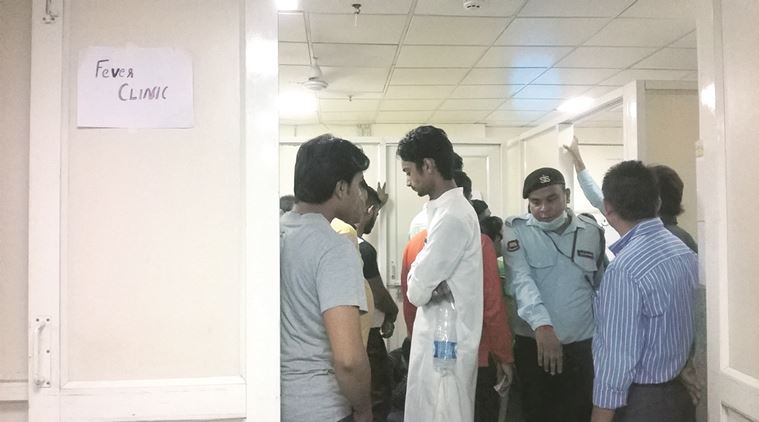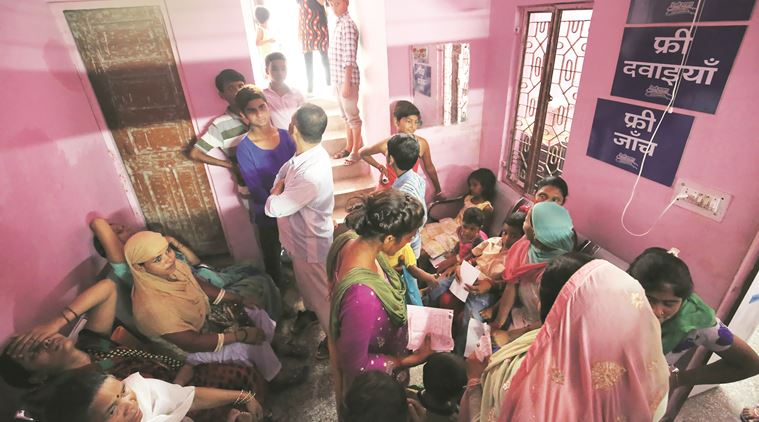Legislators of the ruling AAP have attacked the three BJP-controlled civic bodies for creating a “mess” in the capital and blamed them for the
spike in dengue and chikungunya cases. Counterattacked by the opposition, the AAP says it will set up 300 “fever clinics” in government hospitals, dispensaries, and its mohalla clinics. KAUNAIN SHERIFF M visits three Delhi government-run units in the central zone of South Delhi Municipal Corporation, the worst affected this year, for a ground check on the preparedness to handle the massive inflow of patients.

An increase in the number of cases of dengue, chikungunya and viral infection is testing the preparedness of Delhi government and its medical facilities in dealing with patient inflow. A visit to Lok Nayak Jai Prakash Narayan (LNJP) Hospital’s “animal bite clinic OPD” provides several insights.
At 11.45 am Friday, 16-year-old Razia is slumped over her father Mohammed’s shoulders. She has severe joint pain, accompanied by bouts of vomiting and nausea. Mohammed, a tailor, races towards the animal bite clinic where a special “camp” has been set up for such patients. No stretcher is provided, and Mohammed can no longer bear his daughter’s anguished cries. He tries to barge into a cabin where a doctor is seated, but is stopped by a private security guard. The guard says, “Kuch nahin kar payenge. Parchi bana lo. Jab number ayega, tab dekha jayega (Nothing can be done. Get your appointment slip. When your number comes, the doctor will see you).”
Story continues below this ad
Razia is taken off her father’s shoulders and put on a bed. Three more patients are already on the bed. Razia cries out in pain. Mohammed goes again to the doctor’s cabin. He pleads, “Bacchi roh rahi hai. Pairon main bahut zyada dard ho raha hai (The child is crying. She is suffering from severe joint pain).” The doctor does not respond, the guard does: he pushes back Mohammed.
A minute later, the situation gets tense. Ayub, whose wife Kshama has been waiting for two hours for a doctor, begins arguing with the guard. He does not argue for his wife, but Razia. “Meri biwi to 2 ghante se sah rahi hai. Maine kuch nahi bola. Yeh to bacchi hai. Bacchon ke saath aisa vyavahaar nahi hoga (My wife has been patiently waiting for two hours. However, I have not uttered a word. That child is suffering from pain. This kind treatment should not be meted out to children),” Ayub tells the guard. He forcibly takes Razia inside the cabin and requests the doctor to give her immediate attention. Minutes later, Razia is taken to the adjacent room and put on intravenous paracetamol infusion. Kshama’s wait continues.
On the ground floor of the new OPD block of the Delhi government-run LNJP Hospital is the animal bite clinic OPD. Hundreds of patients and their relatives are near the entrance of this approximately 30 ft by 20 ft OPD. Three private security personnel guard this OPD. Barely 10 steps from the entrance, an almost 6 ft tall guard outside the doctor’s cabin, shouts: “Ek patient ke saath sirf ek andar ayega (Only one person will accompany the patient).” He keeps repeating the message, but many ignore it. This is one of the 355 “fever clinics” set up by the Delhi government this year to deal with patients with symptoms of dengue and chikungunya.
While Razia is lucky to get attention at this special camp, many patients wait in the midst of more guards than doctors. Just two of the five nurses tend to the patients, the rest deal with logistics.
Story continues below this ad
Before noon, 25-year-old Momina hurriedly walks into the OPD and tries to enter the doctor’s cabin. The guard blocks her way. She dares him. “Chaar ghante se rok ke rakha hai. Upar jaati hun to neeche bhejte hain. Neeche koi dekh nahin raha hai. Mere paas parchi hai. Tum logon ko aur kya chahiye? Patient ki jaan lena chahte ho kya? (You have kept me waiting for four hours. I went to the first floor. They told me to go down. No one is responding. I also have the appointment receipt. Do you want to take the patient’s life?)” she shouts at the guard. The guard is unmoved and asks her to leave the cabin.
 Patients and attendants at LNJP Hospital’s ‘Fever Clinic’. Oinam Anand
Patients and attendants at LNJP Hospital’s ‘Fever Clinic’. Oinam Anand
Momina has brought her sister-in-law Saima to the hospital from Bhajanpura in northeast district. Saima has been suffering from fever, joint pain and abdominal pain for the past two days. Saima had given birth to a girl by cesarean section 15 days ago in the same hospital. When both are asked to leave the cabin, Momina pleads with the doctor: “Madam uska 15 din pehle hi surgery hua hai. Ab halat bahut kharaab ho gayi hai (She underwent surgery 15 days ago. Her condition is very bad now).” The doctor replies, “Bahar chalo. Yahan pe bacche bhi hain jo intezaar kar rahen hain. Jab number ayega, tab bulayenge (Go outside. There are children here too who are waiting. When your number comes, we will call you)”. The guard interjects, saying, “Chalo jaake neeche baitho. Number ayega to bulayenge (Go sit. When your number comes, we will call you).” Saima sits on the ground on the left corner of the entrance. She waits.
Much like Saima, dozens of patients wait. Taranum, down with fever and shivering, shares a bed with three other patients. Raam Lal, an auto driver, who is on the bed, has been waiting for more than two hours, down with arthralgia (joint pain). When Saima comes in, he asks for a chair. He gets no response.
In an adjacent room, there are 10 beds for patients who have been put on paracetamol infusion for immediate relief from fever. Each bed is shared by either two or three patients. This room has five nurses and only two assisting the patients. The staff shortage is so severe that 12-year-old Vishal holds on to the bottle as he is administered the intravenous paracetamol infusion. His mother is busy getting his blood samples tested.
Story continues below this ad
Razia, who has been lucky enough to get the doctor’s attention, shares her view as she walks out of the clinic. “Pehle to emergency main jaldi se kaam ho jata tha. Ab sab ko iss camp me bhej rahe hain aur yahan pe ghanto bhaita ke rakhte hain. Iss ka kya fayda? Sirf free main medicines dene se kuch nahin hota (At least earlier in the emergency, the treatment used to be faster. Now they are sending us to this camp. What is the advantage when one has to wait for so long? Just giving free medicines achieves little.”
Mohalla clinic at Sangam Vihar
At Asia’s biggest unauthorised colony, Sangam Vihar, the ‘Aam Aadmi Mohalla Clinic’ has a smart tablet that collates data from devices such as ECG and glucometer, and also performs 33 common tests, including blood pressure and urine protein and glucose. It also tests for malaria, dengue, hepatitis and typhoid, and HIV. The claim is that the test only takes a minute or two, and the device uploads data to a cloud-based medical record management system that can be accessed by patients.
The feedback from some patients for the cutting-edge technology will not come as great news for authorities. Rohtash (35), who stays in I block of Sangam Vihar, had his first tryst with the mohalla clinic last Thursday. His wife, Shashi, was bought to the clinic after complaining of high fever, joint pain and vomiting. A blood test was performed. After 48 hours of the test, Rohtash did futile rounds of the clinic for the test report. On Saturday morning, when he asked for the report, the assisting staff, began manually searching the records. There was no “cloud-based medical record management”, alleges Rohtash. After a brief search, no report was found and Rohtash says he was asked to come later. “The clinic is closed on Sundays. Now they want me to come on Monday. Since Thursday, I am being told ‘come later’. I don’t have a job at present. If I had the money, I would have gone to a private hospital. They just gave her fever tablets. Her pain persists. Only the report can tell what is wrong with my wife. Now, I have to wait till Monday,” says Rohtash.
 People wait for their turn at the Mohalla clinic in Sangam Vihar. Praveen Khanna
People wait for their turn at the Mohalla clinic in Sangam Vihar. Praveen Khanna
While delay in providing report might be problem at the clinic, there was a bigger problem last Saturday. The doctor was not there for 75 minutes. The clinic operates for only four hours — 9 am to 1 pm.
Story continues below this ad
Farzana, who was diagnosed with viral flu, was brought to the clinic at 8.30 am. Till 9.45 am, there was a single staff member of the clinic. It was only at 9.45 am that the doctor’s assistant arrived and issued the appointment token. Farzana and at least 40 more patients kept waiting for the doctor.
Munna, who was among the first to arrive at the clinic, says, “I have been here since 8.30 am. The clinic was suppose to open at 9 am. The staff only arrived after 45-minute delay. The doctor arrived at 10.15 am.”
The queue swells after the doctor arrives and many are sent out due to lack of space. Gopal (1) has been brought to the clinic with high fever. His parents are asked to take him outside. “The assistant who issues the parchi has asked us to stay outside. They should first allow children. He is down with heavy fever and we have been asked to stand in the sun. We don’t know when our turn will come,” says Gopal’s mother, Kalyani Jha.
Delhi government dispensary at Batla House
Foul smell and piled up garbage assault the senses at the Government of National Capital Delhi Dispensary in the densely populated Batla House in Okhla. A Delhi government poster at the dispensary informs people about the spread of dengue and chikungunya and the ways to control it. However, right opposite a desert cooler for the doctor’s chamber lie used plastic bottles and plastic waste. It is in such surroundings that more than 600 patients are treated in just four hours. The dispensary, with 11 seats, cannot hold more than 50 people. This leaves many struggling to get a toehold.
Story continues below this ad
Mohammed Rasheed, 14, is down with chikungunya. He has been waiting since 8 am. The boy waits on a footstep. His turn comes at 1 pm, just before the staff goes for lunch. “There is no space inside. We are forced to sit outside in the mess. This time, at least, the condition is better. We had brought him here 20 days ago after he complained of joint pain. There was no place to sit. Worse, it was raining and one could not even stay outside,” says his mother, Shehnaaz.
Asif, who has brought his son Kashif (1) to the dispensary, has found a “cleaner” shelter near the doctor’s vehicle parking slot. “I really don’t care about the cleanliness if my number comes soon. Our areas have not been cleaned for years and that is how it will remain. What can one do?”

 A patient waits at the government dispensary in Batla House. Oinam Anand
A patient waits at the government dispensary in Batla House. Oinam Anand
 Patients and attendants at LNJP Hospital’s ‘Fever Clinic’. Oinam Anand
Patients and attendants at LNJP Hospital’s ‘Fever Clinic’. Oinam Anand People wait for their turn at the Mohalla clinic in Sangam Vihar. Praveen Khanna
People wait for their turn at the Mohalla clinic in Sangam Vihar. Praveen Khanna





